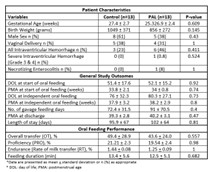Neonatal General
Neonatal General 3: Ethics, Parents Take the Lead
293 - The Efficacy of Pacifier-Activated Lullaby on Oral Feeding Performance in Preterm Infants – A Randomized Controlled Trial
Friday, April 28, 2023
5:15 PM - 7:15 PM ET
Poster Number: 293
Publication Number: 293.132
Publication Number: 293.132
Rowana Mohamed, Nemours Children's Hospital, Orlando, FL, United States; Seungho Lee, University of Central Florida College of Medicine, Orlando, FL, United States; Timothy M. maul, Nemours Children's Hospital, Orlando, FL, United States; Nicole Kirby, Nemours Children's Hospital, Orlando, FL, United States; Sreekanth Viswanathan, Nemours Children's Hospital, Orlando, FL, United States; Caroline Chua, Nemours Children's Health, Orlando, Florida, Belle Isle, FL, United States

Rowana Mohamed, MD (she/her/hers)
PGY-3 Pediatrics
Nemours Children's Health
Orlando, Florida, United States
Presenting Author(s)
Background: Oral feeding difficulties are a common problem in preterm infants in the neonatal intensive care unit (NICU). Recent data suggest that non-nutritive sucking (NNS) oral stimulation with music reinforcement may facilitate oral feeding skill development and performance.
Objective: To evaluate the effect of NNS music reinforcement using pacifier-activated lullaby (PAL) on oral feeding performance of preterm infants.
Design/Methods: This is a single-center double-blinded, randomized control trial conducted at a Level-4 NICU that included preterm infants between 34 0/7 and 35 6/7 postmenstrual age, who were taking at least half of feedings enterally and less than half orally. Exclusion criteria included infants on assisted ventilation, continuous positive airway pressure, or high flow nasal cannula >2 liters per minute. Infants were randomly assigned to receive three daily 15-minute sessions weekly over two consecutive weeks of either PAL with mother's/investigator’s recorded voice or no PAL, along with routine NNS and nursing/maternal care in both groups. Infant’s characteristics and oral feeding performance metrics including overall transfer (OT, volume taken/total volume prescribed), proficiency (PRO, volume taken during 1st 5 minutes/total volume prescribed), endurance (RT, rate of milk transfer), or oral feeding duration were collected and compared between groups. Data were analyzed using SPSS v28. Student’s t-test and Fisher’s exact test were used to compare patient characteristics. Mixed effects modeling using heterogeneous first-order autoregressive repeated effects for the feeding day and group (PAL or Control) and the interaction between group and feeding day as a fixed effect was used to assess longitudinal weight gain, feeding proficiency, and endurance.
Results: A total of 26 infants were included in the study (PAL n=13, control n=13). Table 1 shows infant’s characteristics and general study outcomes that showed no significant differences in both groups. There was a non-significant drop in weight in the control group around Day 8, followed by continued growth, while the PAL group had a steady growth. (p=0.97, Figure 1) There were no significant differences in oral feeding performance metrics (OT, PRO, RT, and oral feeding duration) between the groups.
Conclusion(s): Music reinforcement of NNS using the PAL did not improve the oral feeding performance in preterm infants.

.jpg)
